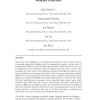Free Online Productivity Tools
i2Speak
i2Symbol
i2OCR
iTex2Img
iWeb2Print
iWeb2Shot
i2Type
iPdf2Split
iPdf2Merge
i2Bopomofo
i2Arabic
i2Style
i2Image
i2PDF
iLatex2Rtf
Sci2ools
109
click to vote
AI
2005
Springer
2005
Springer
Choosing words in computer-generated weather forecasts
One of the main challenges in automatically generating textual weather forecasts is choosing appropriate English words to communicate numeric weather data. A corpus-based analysis of how humans write forecasts showed that there were major differences in how individual writers performed this task, that is, in how they translated data into words. These differences included both different preferences between potential near-synonyms that could be used to express information, and also differences in the meanings that individual writers associated with specific words. Because we thought these differences could confuse readers, we built our SumTimeMousam weather-forecast generator to use consistent data-to-word rules, which avoided words which were only used by a few people, and words which were interpreted differently by different people. An evaluation by forecast users suggested that they preferred SumTime-Mousam's texts to human-generated texts, in part because of better word choice;...
| Added | 15 Dec 2010 |
| Updated | 15 Dec 2010 |
| Type | Journal |
| Year | 2005 |
| Where | AI |
| Authors | Ehud Reiter, Somayajulu Sripada, Jim Hunter, Jin Yu, Ian Davy |
Comments (0)

